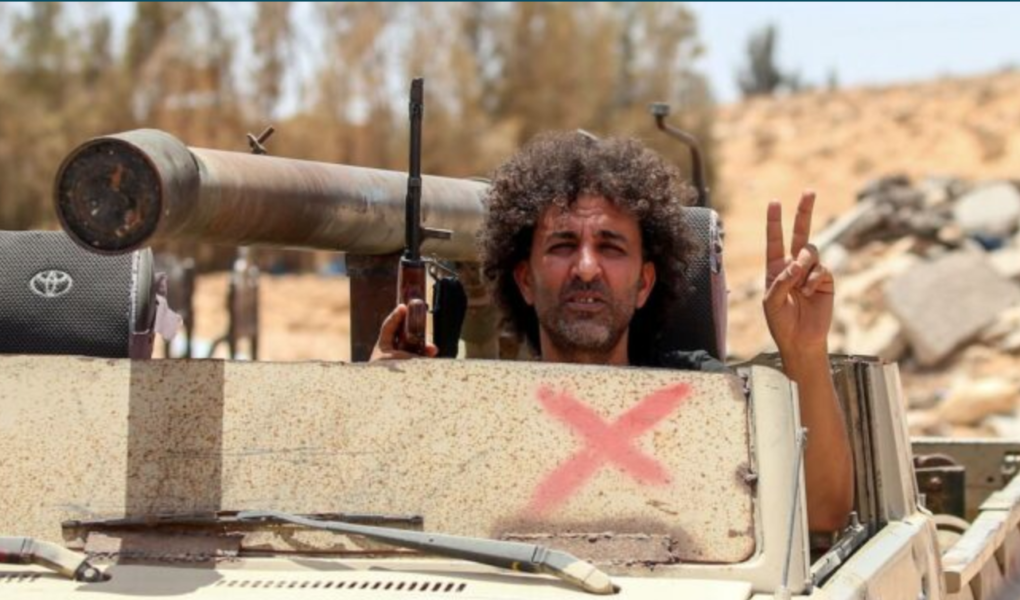Ruptures in Libya’s already fractured politics could cause the country to further spiral out of control only a month after the warring sides agreed to a ceasefire.
After protests against appalling living conditions, the interim government aligned with Khalifa Haftar’s Libyan National Army (LNA) resigned. Meanwhile, the UN-recognized Government of National Accord (GNA) has also faced internal political disputes that could spell the end of recent constructive diplomacy.
Washington’s policy of “active neutrality” to the conflict is increasingly untenable. Active and engaged US leadership is necessary to unfreeze the intractable civil war and prevent Turkey and Russia from using it to dominate the Eastern Mediterranean.
Calls for a ceasefire grew after Haftar’s eastern-based LNA failed to capture Tripoli from the western-based GNA in June, creating a deadlock between the two sides around Sirte. Statements declaring a pause in violence came from GNA Prime Minister Fayez al-Sarraj and Speaker of the House of Representatives Aguila Saleh.
However, Haftar rejected the deal, putting in doubt its long-term viability. In recent days, Haftar has agreed to end an oil blockade that has reduced Libya’s oil output from one million barrels per day to less than 100,000 since January.
Impartial Stance
America’s middle of the road approach towards the two Libyan militant groups complicates its strategic position. Washington formally supports the LNA, but last year President Donald Trump endorsed Haftar’s now-reversed offensive.
After the GNA captured Tripoli, President Trump called Turkish President Recep Tayyip Erdoğan to discuss Libya’s changing landscape.
A few days later, Secretary of State Mike Pompeo publicly commended both sides, saying their decisions “to re-enter UN security talks was a good first step.” The secretary added that “quick and good faith negotiations are now required to implement a ceasefire and relaunch the UN-led intra-Libyan political talks.”
Now, the United States needs to quickly assume a more significant leadership role to prevent Turkey or Russia from using the ceasefire to divide Libya or establish long-term spheres of influence permanently. Either of these developments would threaten America’s regional energy and security interests.
Despite a UN arms embargo, weapons and fighters have flooded to Libya as Russia, Egypt, and the UAE looked to prop up the LNA as Turkey does the same for the GNA. Despite dissatisfaction with Haftar growing, the LNA continues to benefit from Russian warplanes, military contractors, and political backing. With these factors holding, the end of the Libyan conflict is still a distant future.
Lacking Focus on Eastern Mediterranean
The United States’ laidback approach to the Libyan conflict reflects its decades of neglect towards the Eastern Mediterranean. While the region was vitally important during the Cold War, it has featured less in American strategic thinking since.
A lack of US strategic focus on the region has persisted despite sizable offshore energy discoveries and migration flows from conflicts in Libya and Syria into Europe.
Once a trustworthy American ally, Turkey’s aggressive naval presence in the Eastern Mediterranean puts it at odds with other regional partners, such as Greece, Cyprus, Israel, and Egypt.
In November 2019, Turkey further complicated the Libyan conflict by signing two agreements with the UN-recognized GNA. Turkey offered vital military support in exchange for their recognition of Turkey’s maritime claims in a potentially energy-rich section of the Mediterranean Sea. The agreement challenges the much stronger Greek and Cypriot claims to the international waters.
The presence of Turkish military advisors, weaponry, and proxy soldiers has enflamed and prolonged the conflict. By helping the GNA defeat Haftar’s forces and Russian military contractors in Tripoli, Turkey has made itself the dominant player in Libya.
Haftar’s ability to defend his remaining positions depends on Russia’s willingness to support what looks more like a losing position. Russia and Turkey could come to an accommodation, as they have in Syria. That agreement would also likely be at the expense of US interests.
US Must Step up in Libya
The United States should also avoid looking at Libya’s problems in isolation. Russian and Turkish efforts to spread weaponry and influence throughout the region is fueling an arms race. Libya and Syria are each unfortunate settings where this buildup of weaponry has deadly consequences for the local populations.
As competitors like Russia and Turkey try to split the region between themselves, the United States should appoint a Special Envoy for the Eastern Mediterranean, with strongly expressed support from the Trump administration, and where possible from the US Congress.
This diplomat should engage the GNA, LNA, and their backers as they mediate a solution or ceasefire to the conflict to prevent the countries backing both groups from making gains at the expense of the Libyan people. Any progress will have to address Turkish and Russian involvement in Libya and take steps to decrease their military presence.
America’s lack of a consistent strategy in the Eastern Mediterranean has allowed adversaries to fuel the Libyan conflict and expand its influence in the region.
The United States must now take a greater role in efforts to end the fighting. Otherwise, the Turkish and Russian solution will create further turmoil at the expense of the interests of the US, its allies in the Eastern Mediterranean, and perhaps more broadly across the entire Middle East.
Lieutenant General Raymond V. Mason, USA (ret.) is the former Deputy Chief of Staff for Logistics, G4 Army Staff and was a participant on the Jewish Institute for National Security of America’s (JINSA) 2019 Generals and Admirals trip to Israel.
Originally published in The Defense Post

